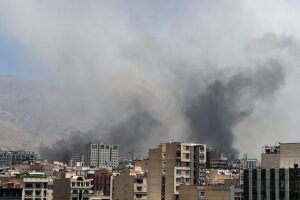Oil futures extended losses late Monday after President Trump said Iran’s retaliatory missile strikes against a US base in Qatar was telegraphed, further cementing optimism that neither country wants to further escalate the Middle East conflict.
West Texas Intermediate (CL=F) fell nearly 9% to hover near $67, while Brent crude (BZ=F), the international benchmark, also tumbled nearly 9% to almost $70 per barrel.
Oil’s slide deepened after Trump wrote on social media, painting Iran’s strikes as a way to get “it all out of their ‘system.'”
“Iran has officially responded to our Obliteration of their Nuclear Facilities with a very weak response, which we expected, and have very effectively countered,” Trump wrote.
“I want to thank Iran for giving us early notice, which made it possible for no lives to be lost, and nobody to be injured,” Trump said. He added he would encourage Israel to seek peace in the conflict.
Oil had surged in the immediate aftermath of the US’s weekend strikes on Iranian nuclear facilities. But it quickly plummeted after Iran launched missile attacks against a US air base in Qatar, matching the number of bombs dropped by the US.
“Iran’s response appears to have been more symbolic than escalatory — targeting US military bases but avoiding any loss of life or damage to energy structure,” Rebecca Babin, senior energy trader at CIBC Private Wealth, told Yahoo Finance on Monday afternoon.
Prior to the retaliatory move, Wall Street weighed various scenarios after the initial US strikes, including the threat of Iran closing the Strait of Hormuz, a critical chokepoint for roughly 20% of the world’s oil flows.
JPMorgan analysts projected the closure would be a “severe outcome” scenario, in which oil futures could spike to $120 to $130.
“Yet, beyond the short-term spike induced by geopolitics, our base case for oil remains anchored by our supply-demand balance, which shows that the world has enough oil,” wrote Natasha Kaneva on Monday morning.
JPMorgan expects oil to trade in the low-to-mid $60 range for the remainder of 2025 assuming the Middle East risk premium fully dissipates.
Year-to-date, Brent and WTI are both down over 5%.
Ines Ferre is a Senior Business Reporter for Yahoo Finance. Follow her on X at @ines_ferre.
Click here for in-depth analysis of the latest stock market news and events moving stock prices
Read the latest financial and business news from Yahoo Finance











